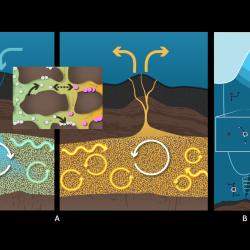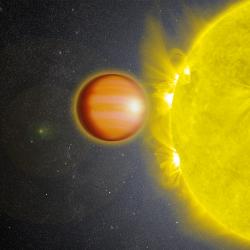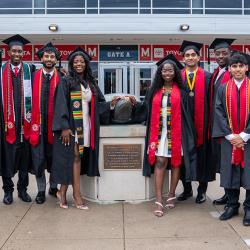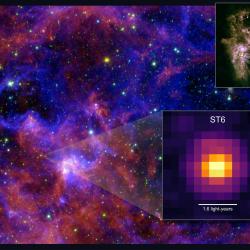Andrew Harris Reappointed as Chair of UMD’s Department of Astronomy for Five-year Term
Harris hired new faculty members, strengthened research ties with NASA and improved research facilities during his first term as chair.
Professor Andrew Harris has been reappointed chair of the University of Maryland’s Department of Astronomy for a five-year term, effective July 1, 2022.
Andrew Harris. Credit: UMD/Lisa Helfert. Click image to download hi-res version.
"I look forward to seeing how Andy builds on his first term as chair to grow and strengthen our research and education programs in astronomy and take them to the next level," said Amitabh Varshney, dean of UMD’s College of Computer, Mathematical, and Natural Sciences.
Harris, who joined UMD in 1997, will continue to lead the department, which has over 150 tenured/tenure-track and professional-track faculty members, nearly 150 students and annual research funding of nearly $40 million.
“I am honored to be able to continue to help the Department of Astronomy move forward,” Harris said. “Our department is exciting, always boiling with ideas and activity. The pandemic has had a huge impact on how we teach, work and interact. As we adapt to living with the virus, I am looking forward to working with everyone to bring back our close sense of community after the disruptions and lessons from the pandemic.”
During his time as chair, Harris oversaw the hiring of Associate Professor Eliza Kempton and Assistant Professors Benedikt Diemer and Thaddeus Komacek, and secured the return of Professor Chris Reynolds from Cambridge University. The department also began awarding the Neil Gehrels Prize Postdoctoral Fellowship and hosting the Mike A'Hearn Endowed Lectureship.
Under Harris’ leadership, the department strengthened research ties with NASA through several cooperative agreements:
- Renewal of the Joint Space-Science Institute cooperative agreement
- Renewal of the Partnership for Heliophysics and Space Environment Research (PHaSER) (led by Catholic University of America)
- $32.5 million extension of the cooperative agreement for UMD to continue managing and administering the Small Bodies Node of NASA’s Planetary Data System
- $178 million extension of the cooperative agreement for UMD to continue leading the Center for Research and Exploration in Space Science & Technology II (CRESST II), a partnership between NASA’s Goddard Space Flight Center and four universities
The department also strengthened its research facilities through improved access to UMD’s supercomputer, a renewal of its partnership in the Lowell Discovery Telescope and the pursuit of radio telescope access.
In his personal research, Harris seeks to understand the energetics and physical conditions within galaxies and their nuclei. Part of this effort involves developing instrumentation for radio observations over wide bandwidths and wide fields of view at the Green Bank Observatory and other sites. Harris’ work also involves spectroscopy of individual high-redshift galaxies and of the integrated molecular emission from clusters of galaxies.
Closer to home, Harris uses data from the Herschel Space Telescope and the Stratospheric Observatory for Infrared Astronomy (SOFIA) airborne observatory to probe our galactic center, to understand the physical conditions in this complex region and to extrapolate these observations to more distant galaxies.
Harris earned his M.A. and Ph.D. in physics from the University of California, Berkeley, and his bachelor’s degree in electrical engineering from the University of California, Davis. Upon completion of his doctorate, Harris spent eight years as a research physicist at the Max Planck Institute for Extraterrestrial Physics in Garching, Germany, before accepting a position as associate professor at the University of Massachusetts Amherst.
Since joining UMD in 1997 as an associate professor, Harris has served on the University Senate, where he sat on the Executive Committee and served two terms as chair of the Programs, Curricula, and Courses Committee. In 2010, he was also named an affiliate professor in the UMD Department of Electrical and Computer Engineering. He has been a visiting scientist at the University of Cologne in Germany, the National Radio Astronomy Observatory, and the California Institute of Technology. Harris is a member of the American Astronomical Society, the International Union of Radio Science and IEEE.








